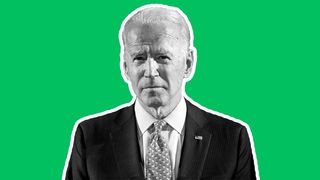In Joe Biden’s inaugural address a central aspiration was for the re-establishment of “truth” as a core commitment in American life: “...each of us has a duty and responsibility, as citizens, as Americans, and especially as leaders — leaders who have pledged to honor our Constitution and protect our nation — to defend the truth and to defeat the lies.” Biden’s speech with its emphasis on a recommitment to “dignity”, “democracy” and truth” (three key words in the address) reflected just how sullied America politics and by association American society has become during the Trump era.
One of the most noteworthy and disturbing features of the Trump presidency was its record of denialism: on climate change, COVID-19, the 2020 election results, systemic racism, and a number of other important issues. This was aided and abetted by an information universe, often on the internet, that widely disseminates lies as truths. The challenge for President Biden will be to not just to address problems like COVID-19, economic distress, climate change, and racism with effective public policies it will also be to have basic realities more broadly accepted by the vast majority of Americans so his policy changes have a chance to be fairly understood and assessed.
Daniel Patrick Moynihan the legendary American intellectual and politician famously remarked that: “Everyone is entitled to his own opinion, but not to his own facts.” This is a quote many are familiar with, but the more unfamiliar continuation of this quote is just as pertinent to the issue of climate change: “Second, decide to live with the facts. Third, resolve to surmount them. Because, fourth, what is at stake is our capacity to govern.” It is crucial that governments everywhere squarely confront the facts about climate change and then embrace the responsibility they have to act to reduce global warming for the benefit of future generations. This is politically a very hard thing to do given the short-termism of electoral politics and the 24-hour news cycle. Therefore, it requires true courage and a commitment to that mindset we all want our children to embrace, deferred gratification. As we have seen with COVID-19 well planned government policy can surmount the wickedest of problems.
What are the facts in terms of climate change that will confront the new Biden administration? Global warming is an issue that requires non-scientists to learn about climate science through seeking out the most reliable sources of information. To just focus on the politics is an abrogation of a fundamental responsibility to future generations. After consulting with experts, the advice I have received is that the World Meteorological Organization Statement on the State of the Global Climate for 2019 sets a gold standard on scientific experts telling non-experts the facts.
The latest report brings together data from “national meteorological and hydrological services, leading international experts, scientific institutions and United Nations agencies.” Just as discussions of containing the spread of COVID-19 needed to start with epidemiologists and other physical and mental health experts; discussions of climate change need to start with the best scientific reports we have. The hard evidence from the 2019 Statement is the earth is warming at a dangerous rate due to human activities. Anyone that denies this increase in temperatures is an expedient innumerate. Of course what politicians make of this hard evidence is going to be open to debate, but justifying your policies on the basis of faulty evidence (or a disregard for evidence) has been a disaster in certain countries during the COVID-19 crisis and the same argument is entirely valid with regard to climate change. The big political challenge is the time frames are very different.
What a Biden administration will mean for Australia?
In 1997 the US Ambassador to Australia Genta Hawkins Holmes gave a speech in which she criticised the Australian government’s approach to environmental policy for its “support of ‘differentiated targets’ based on national economic costs as a rationale for continuing to rely excessively on fossil fuel energy sources.” At the time President Clinton and particularly Vice-President Gore were pushing for higher targets as part of the Kyoto Protocols. In 2000 when George W. Bush was elected president, John Howard and Alexander Downer reportedly celebrated this news with a glass of champagne each, as they had a new president more to their liking.
One of the clichés of the American-Australian relationship is that it has bi-partisan support no matter what party is in power in America or Australia. This is an exaggeration: the George W. Bush Administration’s Iraq war and environmental policies and the Trump Administration in general were opposed by the Australian Labor Party. However, potential clashes and rifts have not come to the fore as the ALP was only in power for just over one year during Bush Jnr’s two terms and was not been in power at all during Trump’s presidency. If Simon Crean had have been Prime Minister in 2003, rather than leader of the opposition, and had delivered a strong rebuke of the US decision to invade Iraq (as he did at the time), the US-Australia alliance could well be less intense and thought of as less bi-partisan than it is today.
Joe Biden’s announcements on his intended environment policies are far more in synch with northern European policies than Australian policies, this could possibly lead to a relationship with the US government that is less simpatico and less intimate. Certain policy differences matter even to strong long-standing alliances. Australian support for the 2003 Iraq war undoubtedly strengthened the US-Australian alliance. The Australian government’s unwillingness to sign up to a target of net-zero emissions by 2050 has the potential to create tensions in the US-Australian relationship. The reason for this is that environmental policies are global, and scrutiny of policy laggards will become more intense now Trump is not in the Oval Office. A central reason for this is that Trump dominated the media and general political attention like no other politician in living memory. Post-Trump politics will change significantly globally including in Australia. The daily show of “look what Trump did now” will be over and the media will have the chance to focus on other problems.
One obvious consequence is a more normal and boring US president will lead to the world media rightly focusing a lot more attention on Xi Jinping’s policies, including his environmental policies. This could be very beneficial for Australia as it could well take some of the heat out of the current Australian-China relationship as the Chinese are likely to be receiving a lot more criticism from more persistent sources than the Australian government. Under these circumstances, less Chinese government attention is likely to be paid to Australia, which will be a welcome relief.
A Biden administration will undoubtedly aim to repair America’s image aboard by making strong commitments to human rights, democracy, the rule of law and significant reductions in carbon emissions. These are commitments that are strongly in Australia’s national interest to be in unison with. Lastly, such policies will put a lot of pressure and attention on China to be a more respect worthy global power.






